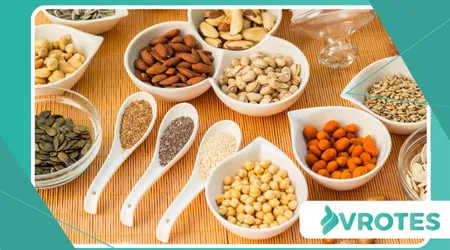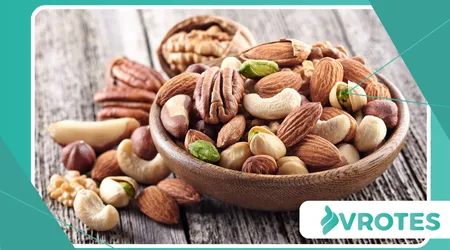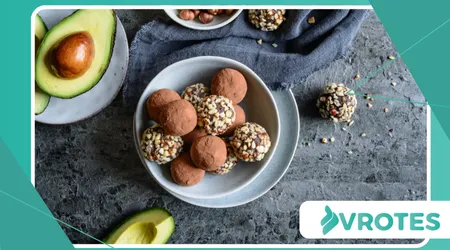Best Nuts and Seeds for Hormone Health

In the quest for hormonal harmony during menopause, understanding the Best Nuts and Seeds for Hormone Health becomes paramount.
Anúncios
This isn’t just about what you eat, but how specific foods can act as allies, easing the transition and supporting your body’s evolving needs.
Navigating Menopause: More Than Just Hot Flashes
Menopause is a significant life stage, often characterized by a symphony of changes.
Hormone fluctuations, particularly the decline in estrogen, can bring about a range of symptoms from hot flashes and night sweats to mood swings and bone density concerns.
It’s a natural process, but one that can be managed and mitigated with the right nutritional strategies.
Anúncios
While hormone replacement therapy remains an option for many, lifestyle adjustments, especially dietary ones, offer a powerful, complementary approach.
Food isn’t just fuel; it’s information for your cells, influencing everything from inflammation to hormone production.
The modern diet often falls short in providing the crucial nutrients needed to support hormonal balance.
Processed foods, excessive sugar, and a lack of essential fats can exacerbate menopausal symptoms. Shifting focus to whole, nutrient-dense foods is a game-changer.
Think of your body during menopause as a finely tuned orchestra. When one section—say, the hormones—is out of sync, the whole performance suffers.
Nutrition acts as the conductor, guiding each instrument back into harmony.
The Tiny Powerhouses: Why Nuts and Seeds Matter
Nuts and seeds, often overlooked as mere snacks, are concentrated sources of vitamins, minerals, healthy fats, and fiber.
Their small size belies their immense nutritional value, making them indispensable for women navigating menopause.
They offer a unique blend of compounds that can directly or indirectly support hormone health.
Many contain phytoestrogens, plant compounds that can mimic estrogen in the body, potentially offering a gentle, natural way to alleviate some menopausal symptoms.
Read more: Anti-Inflammatory Spices to Add to Your Daily Diet
These compounds are not a replacement for estrogen, but they can provide a subtle, supportive effect.
Beyond phytoestrogens, nuts and seeds are rich in magnesium, a mineral crucial for over 300 enzymatic reactions in the body, including those involved in hormone regulation and stress response.
Their high fiber content also aids in digestive health, which is intrinsically linked to hormone metabolism and detoxification.
The healthy fats, particularly omega-3s, found in certain nuts and seeds, play a vital role in reducing inflammation.
Chronic inflammation can disrupt hormone balance, making anti-inflammatory foods like these incredibly beneficial.
Consider a small seed, like a flaxseed, as a miniature pharmacy. It contains lignans, a type of phytoestrogen, and omega-3s, both working synergistically to support your well-being.

The Best Nuts and Seeds for Hormone Health: A Deeper Dive
Let’s explore specific nuts and seeds that stand out for their hormone-supportive properties. Each offers a unique profile of nutrients that can make a tangible difference in your menopausal journey.
Flaxseeds: The Lignan Powerhouses
Flaxseeds are arguably one of the most beneficial seeds for menopausal women.
They are an excellent source of lignans, a type of phytoestrogen that can bind to estrogen receptors. This can help to moderate estrogen levels, offering a gentle balancing effect.
Read here: The Best Phytoestrogen Foods for Hormonal Balance
Research, like a 2015 review published in the journal Nutrients, has indicated that lignans, particularly those found in flaxseed, may have a positive impact on menopausal symptoms.
Their ability to subtly modulate estrogen activity is what makes them so valuable.
Beyond lignans, flaxseeds are rich in alpha-linolenic acid (ALA), an omega-3 fatty acid.
ALA is known for its anti-inflammatory properties, which can help alleviate joint pain and reduce the frequency and severity of hot flashes.
To maximize their benefits, grind flaxseeds just before consumption.
Whole flaxseeds can pass through the digestive system largely intact, preventing full absorption of their nutrients. Add them to smoothies, yogurt, or sprinkle them over salads.
Chia Seeds: The Omega-3 and Fiber Champions
Chia seeds, tiny but mighty, are another essential addition to your diet during menopause.
They are an exceptional source of omega-3 fatty acids, specifically ALA, which contributes to reducing inflammation and supporting brain health.
Their high fiber content is particularly noteworthy.
Fiber is crucial for digestive regularity, which in turn helps in the excretion of excess hormones, preventing reabsorption and supporting a healthy hormonal balance.
Chia seeds also provide a good amount of calcium, magnesium, and phosphorus, all vital for maintaining bone density, a common concern as estrogen levels decline.
++ How to Use Cognitive Behavioral Techniques for Mood Balance
They are incredibly versatile and can be added to almost anything.
Imagine chia seeds as tiny sponges in your digestive system, soaking up toxins and aiding in their elimination, thereby indirectly supporting hormone balance.

Walnuts: Brain Health and Beyond
Walnuts are unique among nuts for their high concentration of ALA omega-3 fatty acids.
While they don’t contain lignans like flaxseeds, their anti-inflammatory power is undeniable, benefiting overall health and potentially reducing menopausal discomfort.
They also offer a good source of antioxidants, which combat oxidative stress, and melatonin, a hormone that regulates sleep.
Sleep disturbances are a common menopausal symptom, making walnuts a helpful addition to an evening snack.
Their nutrient profile also includes magnesium, zinc, and B vitamins, all contributing to nerve function and mood regulation.
A handful of walnuts can be a simple yet effective way to boost your nutrient intake.
Almonds: Calcium and Vitamin E Boost
Almonds are a staple for good reason. They are an excellent source of calcium, crucial for bone health during a time when bone density can decrease.
They also provide a significant amount of vitamin E, a powerful antioxidant.
Vitamin E has been studied for its potential to alleviate hot flashes in some women. While not a cure, it can be a supportive nutrient in managing this common symptom.
Almonds also offer magnesium and healthy fats, contributing to overall well-being and energy levels. They are a convenient and satisfying snack that can be incorporated into various meals.
Pumpkin Seeds: Zinc and Magnesium Stars
Pumpkin seeds are packed with zinc, a mineral essential for immune function, wound healing, and, importantly, hormone production.
They are also an excellent source of magnesium, which helps with sleep, muscle relaxation, and stress reduction.
These seeds contain tryptophan, an amino acid that converts to serotonin, a neurotransmitter that promotes feelings of well-being and improves sleep quality.
This can be particularly helpful for managing mood swings and sleep disturbances.
Their rich nutrient profile makes them a valuable addition to your dietary repertoire, offering support for multiple menopausal symptoms.
Sprinkle them on salads, soups, or enjoy them roasted as a snack.
Sunflower Seeds: Selenium and Vitamin E Rich
Sunflower seeds are often overlooked but offer a wealth of nutrients.
They are a good source of vitamin E, as mentioned with almonds, and also contain selenium, a trace mineral vital for thyroid function.
A healthy thyroid is crucial for overall metabolic and hormonal balance.
They also provide magnesium and healthy fats, contributing to energy levels and reducing inflammation.
These versatile seeds can be added to cereals, baked goods, or enjoyed on their own.
When considering the Best Nuts and Seeds for Hormone Health, remember that variety is key.
A diverse intake of these nutritional powerhouses ensures you’re getting a broad spectrum of beneficial compounds.
Practical Integration: Making Nuts and Seeds a Daily Habit
Incorporating these nuts and seeds into your daily diet doesn’t have to be complicated. Start small and build up.
Add a tablespoon of ground flaxseeds or chia seeds to your morning oatmeal or smoothie.
Sprinkle pumpkin or sunflower seeds over your salads or soups for an added crunch and nutritional boost.
Carry a small bag of mixed nuts and seeds (walnuts, almonds, and pumpkin seeds are a great combo) for a healthy, satisfying snack on the go.
Avoid nuts and seeds roasted in unhealthy oils or loaded with excessive salt. Opt for raw or dry-roasted varieties.
One effective strategy is “seed cycling,” though its scientific evidence is still emerging, it’s a popular anecdotal approach.
This involves consuming specific seeds during different phases of your menstrual cycle (even if irregular or absent during menopause) to support hormone balance.
For example, flax and pumpkin seeds during one phase, and sesame and sunflower seeds during another. While not a magic bullet, it highlights the potential of these foods.
Think of these tiny foods as building blocks for your hormonal architecture. Each one contributes to a stronger, more resilient foundation.
Beyond Nuts and Seeds: A Holistic Approach
While the Best Nuts and Seeds for Hormone Health are invaluable, remember they are part of a larger nutritional mosaic.
A holistic approach to menopausal health includes a balanced diet rich in whole foods, lean proteins, and plenty of fruits and vegetables.
Stay hydrated by drinking ample water throughout the day. Prioritize quality sleep, and engage in regular physical activity.
Stress management techniques like yoga or meditation can also profoundly impact hormonal balance.
Consult with a healthcare professional or a registered dietitian to tailor a nutritional plan that meets your individual needs.
They can offer personalized advice and ensure your dietary choices align with your health goals.
Remember, menopause is not an endpoint but a transition.
Equipping yourself with the right knowledge and making informed dietary choices empowers you to embrace this new chapter with vitality and well-being.
What small change can you make today to support your hormonal health?
Frequently Asked Questions
Can nuts and seeds completely eliminate menopausal symptoms?
While nuts and seeds can significantly support hormonal balance and alleviate symptoms, they are not a magic bullet.
They work best as part of a comprehensive approach including a balanced diet, regular exercise, and stress management.
Are there any side effects to consuming a lot of nuts and seeds?
In moderation, nuts and seeds are generally safe. However, consuming excessive amounts can lead to digestive upset due to their high fiber content. Always increase your intake gradually and ensure adequate hydration. People with nut allergies should, of course, avoid them.
How should I store nuts and seeds to maintain their freshness?
A: Nuts and seeds are best stored in an airtight container in a cool, dark place, such as your refrigerator or freezer. This prevents them from going rancid due to their high oil content.
Are there specific nuts and seeds to avoid during menopause?
A: Generally, most nuts and seeds are beneficial. However, avoid those roasted in unhealthy oils (like hydrogenated oils) or coated in excessive salt or sugar.
Opt for raw, unsalted, or dry-roasted varieties.
Q: Can menopausal women with diverticulitis eat nuts and seeds?
A: This is a question best answered by a healthcare professional.
While nuts and seeds are generally healthy, for individuals with diverticulitis, especially during flare-ups, certain foods might need to be avoided. Always consult your doctor for personalized dietary advice.
